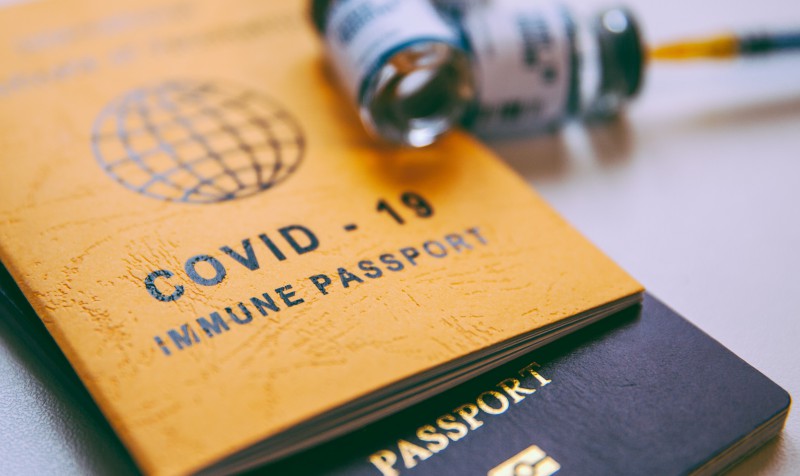Rep. Marjorie Taylor Greene called it, “Biden’s mark of the beast” and a form of “corporate communism.” Weeks later, Rep. Madison Cawthorn compared it to the way Hitler required all Jews wear the Star of David band on their right arms. The executive order President Biden signed in January, which, among other measures aimed at controlling the pandemic, hinted at some possibility of a “vaccine passport”— a digital or physical certificate indicating your COVID-19 vaccination status that would allow you to travel, attend public events, enter large venues, receive business services, and go to school.
With increased vaccinations around the country, the U.S. is cautiously inching towards a hopeful end to the pandemic, but there remains much curiosity of what our post-pandemic life will be like. In such a scenario with vaccine passports, if you were to board a plane or go to the Superbowl, you’d be required to scan some sort of QR code or physical paper that indicates you’re vaccinated to be allowed in. But as seen in the charged statements made by Rep. Greene and Rep. Cawthorn, there has been harsh backlash that contend that vaccine passports are this unprecedented act of government with several consequences, such as discrimination against anti-vaxxers and the unvaccinated, and a potential invasion of privacy. In order to address this backlash, we must turn to U.S. history to better inform us about the legality and feasibility of vaccine passports. Can we really liken vaccine passports to Hitler’s decree that required Jews to wear the Star of David? Do we really find ourselves in unprecedented territory?
Of course, pandemics and infectious diseases aren’t new, and the government has been forced to be flexible in the past, performing nontraditional roles and passing different laws than we’re used to, such as enforcing mask mandates and implementing social distancing rules. These rules have unsurprisingly generated controversy throughout this pandemic, with opponents claiming that the government has overstepped its boundaries with the passage of such laws. But if we allow U.S. history to inform our opinions and understand that disease outbreaks have happened before, then we shouldn’t view these measures as some unprecedented intrusion by the government, but rather as necessary and temporary public health measures.
For instance, in 1902, when faced with a smallpox epidemic in the early 1900s, the Board of Directors in Cambridge, Massachusetts enacted compulsory vaccination laws to halt its spread. This move by the Board of Directors led to the historic Jacobson v. Massachusetts, in which a Cambridge resident contested that the act was a violation of due process under the 14th Amendment. Although there was controversy as to whether or not the city of Cambridge was allowed to do this, the Supreme Court ultimately upheld states’ authority to enact compulsory vaccination laws given the high concerns for the smallpox outbreak. Citing the emergency situation the city of Cambridge had been confronted with, Supreme Court Justice Marshall Harlan stated, “Upon the principle of self-defense, of paramount necessity, a community has the right to protect itself against an epidemic of disease which threatens the safety of its members.” This was during a time when infectious diseases were the leading cause of death in the U.S., making vaccinations a pressing issue. This is not too distant from our current reality— COVID-19 has shortened the average American life expectancy, and was the third leading cause of death in the U.S. last year. Jacobson v. Massachusetts has been the legal case that has been the foundation of government mandated health policies such as our mask mandates today.
Thus, when reflecting on the history of epidemics in the U.S., we learn that the government has been prompted to enforce different, nontraditional laws in the aims of protecting public health. This also applies to vaccine passports, or proof of vaccination, which are just another public health bargain to help bring about a safer return to normalcy. Therefore, the possibility of a vaccine passport for COVID-19 is nothing to fear. Even at the international level, the World Health Organization (WHO) has issued vaccine passports in the past, such as the “Yellow Card,” a document that indicates one is vaccinated against various diseases ranging from cholera, yellow fever, to rubella. These yellow cards are required to fly to certain countries, just as a proof of COVID-19 vaccine inoculation would act as a ticket to enter different countries.
Likewise, and perhaps closer to our current reality, the smallpox epidemic in the U.S. in the late 19th and early 20th centuries had also used proof of vaccination as a tool to help resume normal life. In fact, proof of smallpox vaccination (or the smallpox scar as proof that one survived the disease) played a key role in everyday life, acting as a ticket to board trains, attend school, and even have gatherings at home with different households. For example, during a smallpox outbreak in Chattanooga, Tennessee in the early 1880s, one Memphis newspaper reported, “At Chattanooga, when a doctor and a policeman enter a house together the folks inside know that they have to show a scar, be vaccinated, or answer to the law.” When Kansas City suffered another smallpox outbreak in 1921, “show a scar” was the official admissions ticket to lodges and social gatherings. Another landmark case sheds further light on this issue. In response to the smallpox epidemic, Zucht v King (1922) established that school districts can require vaccine documentation from children, and can exclude children from attending school if they lack the proper vaccinations. When we detach any political meaning to vaccine documentation, we understand they are just public health measures that help prevent the spread of disease.
There are, however, concerns that vaccine passports are a violation of privacy, as they require you to disclose confidential medical information. Others are concerned with vaccine passports becoming a slippery slope which would lead to us being required to disclose even more personal medical information besides just COVID-19 vaccine documentation. However, if we look at history, proof of vaccination has never been used to further government surveillance goals. It is important to remember that these vaccine documentation would only collect required medical information— in this case, whether or not you’ve been vaccinated— and not any other medical history. So no, vaccine passports are not this novel idea that would bring about this totalitarian, dystopian state.
There are other concerns with vaccine passports discriminating against the unvaccinated. However, this mostly lies in the power of businesses themselves, and not the state. Businesses have the right to refuse service to anyone, including those without a vaccine passport. Attorney Lisa Proskin equates the requirement of vaccine passports to the “no shirt, no shoes, no service” policy. She says, “If you don’t have shoes on, they don’t have to let you in. If you go to a business that uses the [vaccine] passport and you don’t have one, they don’t have to let you in.” Legally, this isn’t a form of discrimination either. Even if businesses reserve this right to refuse service, they aren’t able to discriminate against protected classes, such as race, religion, sex, age, or disability. COVID vaccination does not definitively fall under any of these categories.
Of course it is still important to shed light on the possibility of inequities brought on by COVID-19 passports, specifically for those who cannot get vaccinated due to religious reasons, or conflicting medical conditions. Thus, as the European Union has proposed, these vaccine passports should not just exclusively indicate your COVID vaccination status, but also if you have a negative COVID test, or if you have recovered from the illness before. This would accommodate those who cannot get vaccinated while still allowing for the safer movement of people.
The vaccine passport could potentially also disadvantage those who have had difficulty accessing the vaccine, such as low-income communities in the U.S., as well as those in countries where the vaccine rollout is unfortunately lagging. So, if we say yes to vaccine passports, the U.S. must also do its part in ensuring that there is equal access to the vaccine both domestically and abroad in order to prevent the exacerbation of global inequalities.
This debate over vaccine passports is simply another symptom of the party polarization, which we should not allow to claim more lives than the pandemic already has. As Berkeley Law Professor Dorit Rubenstein Reiss stated, “The controversy is strictly a political one.” Vaccine passports, despite being a question of legality for some, should not become another political issue. After watching the pandemic ravage and devastate Americans and people around the world for over a year now, we must take advantage of any opportunity that can usher us into a safer return to normalcy. If we allow history to inform us, then we understand that vaccine passports have proven to work in the past. Therefore, it is only responsible that we accept them in order to end this pandemic.
Featured Image Source: The Regulatory Review






Comments are closed.